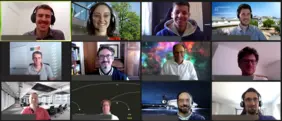We are pleased to congratulate the Brazilian students Bruno José Souza and Lucas Correa de Assis on their well-deserved victory of the I. AI@motion Challenge.
They are studying at Pontifícia Universidade Católica do Paraná (PUCPR) in Brazil and, with support by their supervisor Prof. Roberto Zanetti Freire, have programmed a special AI software for the "MobiBox". The MobiBox is a handheld device that contains all the sensors and intelligence necessary to move and steer all types of vehicles. It can be connected to an autonomous air cab, a self-driving car, a city scooter, or a bicycle.
The task was to program the MobiBox to take commands in natural language and be able to execute them in a simulated world while connected to either a drone, car, or scooter. The goal was that the MobiBox is able to provide enough information about the environment to allow the transportation devices drone, car, scooter, and bicycle to safely navigate their environment. The open-source simulator Airsim was used for the simulation.
An international jury from Germany and Brazil evaluated the students' results, and selected the team led by José Souza and Lucas Correa de Assis as the winners.
We now hope to give the team the opportunity to travel to THI in Ingolstadt and bring the MobiBox to life with the help of a TurtleBot and present the application of their AI software in real life.
The AI@motion Challenge was organized by the Center of Entrepreneurship and AI@motion International together with Prof. Dr. Munir Georges and Prof. Dr. Torsten Schön from THI.
The project AI@motion International, funded by the DAAD and BMBF, promotes international networking of the university on the topics of AI and mobility with the strategic partner countries Brazil, China, and Finland.
The Center of Entrepreneurship is the start-up center of THI with the goal to promote scientific spin-offs and a lively start-up culture (also with partner universities).

